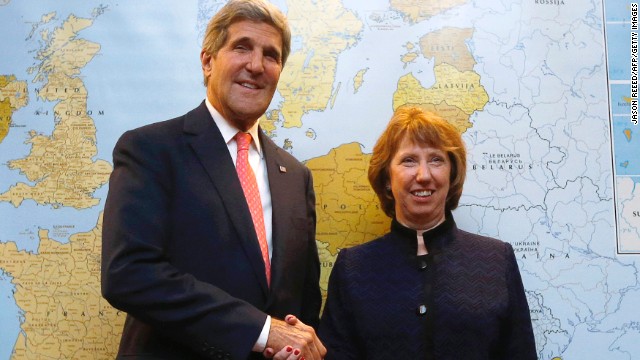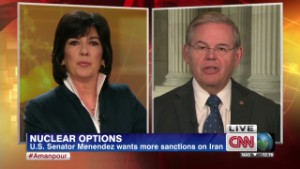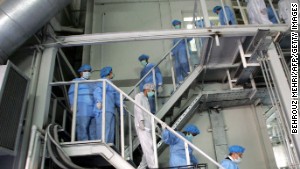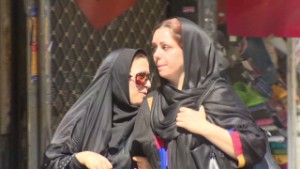
U.S. Secretary of State John Kerry and EU foreign policy chief Catherine Ashton have joined the Iran negotiations.
- NEW: "Very good progress" cited by British Foreign Secretary William Hague
- NEW: Kerry, Ashton among diplomats at talks Saturday
- NEW: "Flexibility" required for a deal, Hague says
Geneva, Switzerland (CNN) -- Britain's top diplomat says talks in Europe over Iran's controversial nuclear program "have made very good progress," even though crucial issues remain unresolved.
"We have to give a lot of time and attention to those issues," Foreign Secretary William Hague said in Geneva, Switzerland, as he headed to meetings on Saturday. "And there is no fixed time for us to reach a conclusion.
"The Iranian nuclear program is very extensive, it has many different aspects, and therefore any deal the world can have confidence in has to be detailed; it has to be exhaustive," Hague said.
World powers and Iran have been at loggerheads over Tehran's nuclear aspirations. They are working toward a breakthrough deal that could slow Iran's suspected progress toward a nuclear bomb while easing some punishing economic sanctions over its nuclear program.
It is widely believed that Iran harbors aspirations to produce nuclear weapons. Repeated findings by U.N. weapons inspectors indicate that the country appeared to be conducting nuclear weapons research.
Iran has always maintained that its nuclear program is for purely peaceful purposes. Even though Iran has denied working toward nuclear weapons, it has said it will not submit to any plan that would totally eliminate its nuclear program.
Sudden progress in meetings between Iran and the group of nations known as the P5+1 or EU3+3 -- the United States, France, Britain, Russia, China and Germany -- comes after years of stalemate between Western nations and Iran over its nuclear program. It also follows a slight thaw in relations between Iran and the West under newly elected President Hassan Rouhani.
Hague said that arriving at a deal will be a painstaking process.






"It has to provide for the necessary transparency and a different approach in Iran in the future from the past. And therefore, it's not surprising that they're detailed negotiations and that they may need to go on for some time."
Top diplomats from those nations have rushed to Geneva on Friday to see whether they could close the deal. The chief Iranian negotiator, Foreign Minister Mohammad Javad Zarif, had predicted that a deal was in the works.
U.S. Secretary of State John Kerry and EU foreign policy chief Catherine Ashton have joined the negotiations. Ashton spokesman Michael Mann said Saturday that she had been huddling with her counterparts throughout the day.
For years, international leaders have been fearful of the instability a nuclear-armed Iran could bring to the Middle East.
Those fears, for example, include the possibility of a pre-emptive Israeli strike that could spark a broader conflict. In the past, Iran has threatened Israel with military attack.
Iran has been under crippling U.N. sanctions related to its nuclear program since 2006, and those sanctions have hobbled the nation's economy. The United States first sanctioned Iran over its nuclear program in 2000.
Resolutions and sanctions passed by the United Nations seven years ago called on Iran to halt all enrichment activities and clarify that its nuclear facilities were being used for peaceful purposes only.
Israeli Prime Minister Benjamin Netanyahu, who is not involved in the talks, warned that the proposed agreement is "the deal of a century for Iran" but a "very dangerous and bad deal for peace."
"It's a very bad deal," he said. "Iran is not required to take apart even one centrifuge. But the international community is relieving sanctions on Iran for the first time after many years. Iran gets everything that it wanted at this stage and pays nothing."
Responding to Netanyahu's remarks, Hague asked for trust and understanding.
"We haven't done the deal yet. We haven't made this deal yet. So I think everybody will have to comment on it if and when we reach a successful conclusion, and make their judgment about it then. So I'd ask everyone to be patient and to wait for us to arrive at that conclusion if we can."
Hague stressed that any agreement would "require some flexibility on all sides." He is cautiously optimistic, citing the mood among diplomats.
"The atmosphere of these negotiations, as others have told you before, is completely different from the atmosphere of a few months ago. Clearly, dealing with these ministers from Iran is a different experience from the recent past. So a lot of progress has been made, but it's too early to say that we will reach a successful conclusion today," Hague said.
CNN's Karl Penhaul reported from Geneva. CNN's Elise Labott reported from Washington. CNN's Yousuf Basil, Andrew Carey, Jo Shelley and Joe Sterling contributed to this report.
